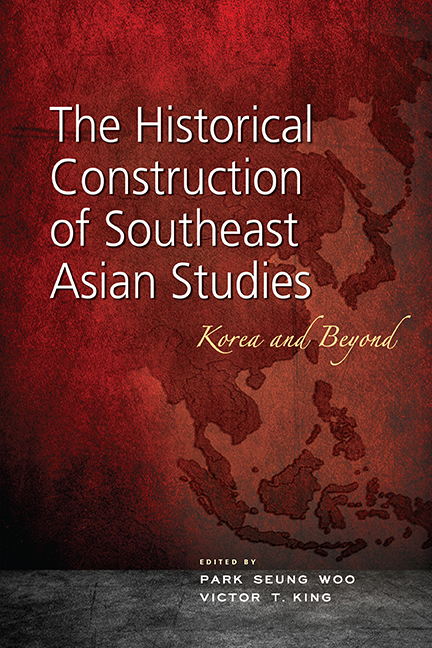Book contents
- Frontmatter
- Contents
- List of Tables
- List of Figures
- Foreword
- Acknowledgements
- About the Contributors
- 1 Introduction: The Historical Construction of Southeast Asian Studies and the Emergence of a Region
- PART I NORTHEAST ASIA
- PART II SOUTHEAST ASIA
- PART III EUROPE
- PART IV AUSTRALIA AND THE U.S.
- 10 A Genealogy of Southeast Asian Studies in Australia: Scholars and Their Works
- 11 Southeast Asian Studies in the U.S.: Construction of Traditions of an Autonomous History, Its Limitations, and Future Tasks
- Index
11 - Southeast Asian Studies in the U.S.: Construction of Traditions of an Autonomous History, Its Limitations, and Future Tasks
from PART IV - AUSTRALIA AND THE U.S.
Published online by Cambridge University Press: 21 October 2015
- Frontmatter
- Contents
- List of Tables
- List of Figures
- Foreword
- Acknowledgements
- About the Contributors
- 1 Introduction: The Historical Construction of Southeast Asian Studies and the Emergence of a Region
- PART I NORTHEAST ASIA
- PART II SOUTHEAST ASIA
- PART III EUROPE
- PART IV AUSTRALIA AND THE U.S.
- 10 A Genealogy of Southeast Asian Studies in Australia: Scholars and Their Works
- 11 Southeast Asian Studies in the U.S.: Construction of Traditions of an Autonomous History, Its Limitations, and Future Tasks
- Index
Summary
INTRODUCTION
This chapter examines the current state and future objectives of Southeast Asian Studies in the U.S. The U.S. is a leading country in terms of Southeast Asian Studies within the general field of area studies. Area studies began to assume importance in the U.S. in the context of American concerns about the expansion of Third Word Communism during the Cold War period. Amidst this tense international atmosphere, Southeast Asianists in the U.S. set themselves against what they considered to be the limitations of European colonial studies preoccupied with the Western presence and role in Southeast Asia and the reconstruction of the history and cultural traditions of those whom they governed. They instead focused more on the circumstances of modern Southeast Asia, post-colonial nation-building and the prospects and problems for socio-economic and political development. Some scholars also argued for the need to consider and understand the region from local perspectives and to construct an autonomous history of the region, which focused on local genius, views, interests and initiatives. American scholars in the field of Southeast Asian Studies have been dominant in the post-war development of theoretical and conceptual frameworks in order to understand processes of change and modernization in the region and to capture the main characteristics of what it is to be Southeast Asian. The outcomes of these theories have often served as templates for students in the field.
Yet, the “Western-oriented perspectives” that American scholars intrinsically sustain have functioned as epistemological barriers in investigating the “peculiarities of Southeast Asianness” in further depth. Thus, while recognizing the major contributions of American scholars in establishing Southeast Asian Studies as a positive and meaningful field, it should be pointed out that some of the scholarly themes and discourses on Southeast Asia must now to some extent be questioned.
To examine the general state of Southeast Asian Studies in the U.S., this chapter commences with a consideration of its development and the intellectual climate in which it flourished over the last several decades; and, second, it addresses popular scholarly themes in the past and currently emerging themes. Through an examination of these two sets of themes, this chapter will examine how American scholars have perceived Southeast Asia; what scholarly contributions they have made; and what have been pointed out as the limitations of their scholarly work.
- Type
- Chapter
- Information
- The Historical Construction of Southeast Asian StudiesKorea and Beyond, pp. 399 - 426Publisher: ISEAS–Yusof Ishak InstitutePrint publication year: 2013



